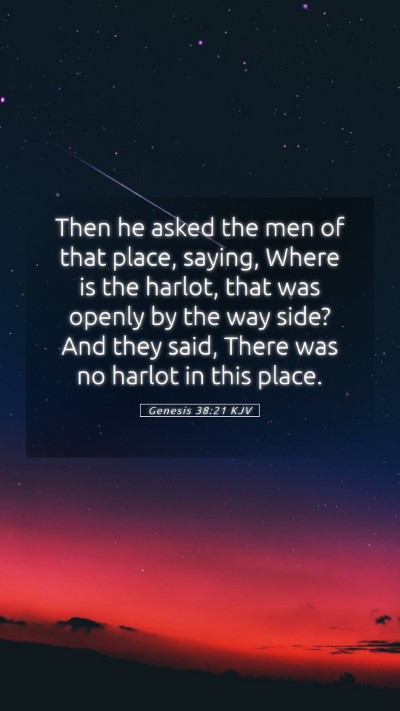Understanding Genesis 38:21 - A Biblical Exegesis
Genesis 38:21 states: "And he asked the men of that place, saying, Where is the harlot, that was openly by the way? And they said, There was no harlot in this place." This verse unfolds a significant event in the narrative concerning Judah and Tamar, offering rich insights into both cultural contexts and moral lessons that resonate through time.
Contextual Analysis
In understanding this scripture, it's crucial to recognize the historical and cultural backdrop of the time. Judith engages in a commitment to preserve lineage, which ties into the broader themes of family, morality, and divine providence. The public domain commentaries from Matthew Henry, Albert Barnes, and Adam Clarke shed light on these aspects, helping us grasp the complexity of the narrative.
Commentary Insights
-
Matthew Henry's Commentary:
Henry describes the scene where Judah, now separated from his family, encounters trouble stemming from his actions. The query about the harlot serves as a pivot to reveal not only Tamar's ruse but also Judah's moral failings. It illustrates a lack of awareness of his family dynamics and the repercussions of his decisions.
-
Albert Barnes' Notes:
Barnes highlights the cultural implications of prostitution in that era, suggesting that the phrase "there was no harlot in this place" indicates the stratified societal norms that allowed for veiled operations. This adds depth to the understanding of Tamar's plight, reflecting on her desperate measures to secure her position in the family lineage.
-
Adam Clarke's Commentary:
Clarke provides expansive insight into the significance of Judah's actions, emphasizing how his inquiry about the harlot uncovers the broader implications of personal integrity and the plan of God in preserving the line of Judah, which would ultimately lead to the Messianic lineage.
Moral and Theological Implications
The inquiry about the harlot is not merely a narrative detail; it serves as a reflection on human nature and the complexities of relationships. It leads to reflections on personal integrity, accountability, and God's overarching sovereignty in human affairs. From a theological standpoint, this verse illuminates the contrast between human decisions and divine purposes.
Application to Modern Life
The teachings found in Genesis 38:21 can easily be integrated into daily living and reflections during a Bible study group. By examining the corresponding moral questions raised by this passage, individuals can evaluate their own relationships and societal norms that they encounter. It encourages a dialogue on personal responsibility and the subtexts that influence our choices today.
Related Scripture Cross References
- Genesis 38:14: Tamar disguises herself as a harlot.
- 1 Chronicles 2:4: Judah's descendants and their importance.
- Matthew 1:3: An acknowledgment of Tamar in the genealogy of Jesus.
Conclusion
In conclusion, Genesis 38:21 provides a canvas on which we can explore the deep-rooted complexities of human relationships, morality, and divine plans through historical context and cultural practices. Through detailed biblical exegesis and scripture analysis, individuals seeking Bible verse meanings or interpreting difficult Bible passages can find significant lessons that apply to their own lives.


